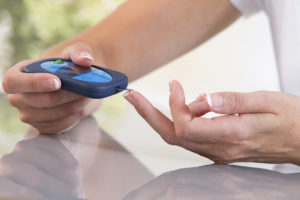


A diagnosis of diabetes is a life-changing event, to be certain. It adds many more considerations into daily life: managing what you eat, checking sugar levels, and perhaps engaging in more exercise, among other challenges. One matter that gets neglected by many, however, is making sure your feet remain healthy. Diabetic foot care is an essential part of a good maintenance routine, as this part of your body can become much more vulnerable than people may expect.
 How Diabetes Affects the Feet
How Diabetes Affects the FeetThis disease can have a number of negative effects on the body, and the feet—due to their position and exposure—can face plenty of danger. Nerve damage and poor circulation from the effects of the disease can often reduce the sensation and healing abilities of the feet, being the extremities furthest from the heart. This can lead to a dangerous one-two combo where damage to the feet isn’t felt and takes longer to heal. Untreated injuries can develop into large ulcers and serious infections, some of which unfortunately result in amputations each year.
Good diabetic foot care means taking steps to help prevent damage to your feet in addition to discovering problems early. It’s a daily commitment, but one that can be slipped into a routine pretty easily.
It is important to inspect your feet every day, checking the top, sides, heels, soles, and even between the toes. If you need help seeing, use a mirror or have a loved one assist you. If you find any sores, cuts, blisters, bruises, or discoloration, contact our office as soon as possible. You should also take care to wash your feet every day and pat them dry carefully, especially between the toes where fungus can take hold in moist areas.
After washing your feet, keep your skin moisturized by applying a thin coat of lotion over both the top and bottom of each foot. Avoid placing lotion between your toes because, again, we don’t want that area to hold too much moisture. This would also be a good time to keep your toenails trimmed, if needed. Remember to trim straight across and file the edges to help prevent ingrown toenails and scratches.
When out and about, think protection. Avoid walking barefoot, especially outside. Wear comfortable shoes and socks at all times, and check the insides of your shoes for foreign objects before putting them on. Watching out for the damaging effects of heat and cold is important as well. Test water for temperature before placing your feet in it, and don’t use hot water bottles or heating pads. You may experience burns on your feet without even noticing.
Finally, but not least, have a trusted foot care specialist who can perform a thorough examination of your feet at least once per year and serve as a go-to when problems arise. Trying to treat problems like warts, corns, calluses, and ingrown toenails at home is only inviting infection if you have diabetes. We have the experience and professional tools to take care of these issues safely and effectively. We can also help you find helpful equipment such as diabetic shoes, and also see if these items can be covered by Medicare or your insurance.
If you need someone in your corner for diabetic foot care, Dr. Kevin Powers can provide the support you need. Schedule an appointment with our Bloomington office by calling (812) 333-4422 or request an appointment online.